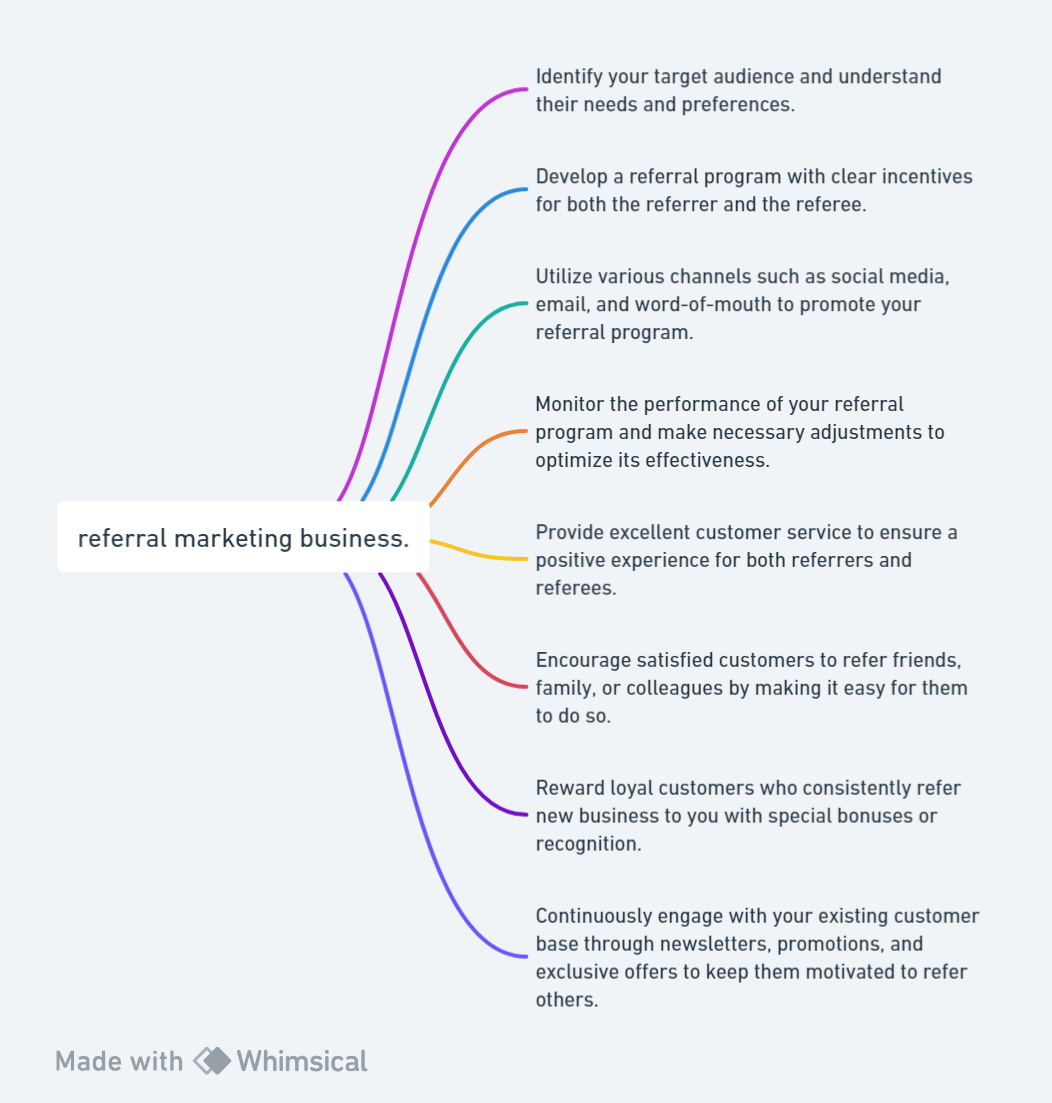In the competitive business environment of today, referral marketing has emerged as an indispensable strategy for driving growth and customer acquisition. By leveraging the power of word-of-mouth, businesses can tap into a vast network of potential customers who are more likely to trust and engage with recommendations from their peers. referral marketing business offers numerous benefits, including:
Introduction: Overview of the importance of referral marketing in today’s business landscape.

In the rapidly evolving landscape of modern commerce, the significance of leveraging a referral marketing business strategy cannot be overstated. This approach has emerged as a cornerstone for sustainable growth and competitive advantage, underscoring its critical position in the array of digital marketing tactics. By understanding the essence and the impact of referral marketing business practices, companies can unlock unparalleled opportunities for expansion and customer loyalty.
1. The Foundation of Referral Marketing Business
Referral marketing business techniques rest on the simple premise of utilizing word-of-mouth to promote products or services. However, the sophistication with which this strategy is applied in the digital age transforms it into a powerful tool. At its core, referral marketing business models incentivize existing customers to recommend a brand to their personal and professional networks. This method capitalizes on the trust and credibility inherent in personal recommendations, amplifying the effectiveness of the marketing message.
2. Why Referral Marketing Business is More Relevant Than Ever
In an era where consumers are bombarded with countless advertising messages daily, the authenticity and trustworthiness of a referral stand out. The referral marketing business model harnesses this trust, turning satisfied customers into brand ambassadors. This not only enhances the reach of marketing efforts but also improves the quality of customer engagement. The digital landscape offers myriad channels for referrals—social media, email, direct messaging—each providing a unique platform for sharing and promoting referrals.
3. The Strategic Advantage of Referral Marketing Business
Embracing a referral marketing business strategy offers companies a competitive edge in several ways. Firstly, it significantly lowers the cost of customer acquisition, as referrals often come with a higher conversion rate compared to other marketing channels. Secondly, customers acquired through referrals tend to have a higher lifetime value, owing to the trust factor associated with personal recommendations. Lastly, a successful referral marketing business initiative fosters a community of engaged customers, which can lead to increased brand loyalty and customer retention.
Referral Marketing Automation: A Beginner’s Guide in 2024
Strategies for Success: Step-by-step guide on creating a successful referral program

Creating a successful referral program is a vital component of any referral marketing business strategy. This step-by-step guide outlines the key phases in designing and implementing a referral program that not only engages your existing customers but also attracts new ones. By following these strategies, businesses can maximize the impact of their referral marketing efforts.
1. Define Your Goals
The first step in creating a successful referral program for your referral marketing business is to clearly define your objectives. What do you hope to achieve? Whether it’s increasing your customer base, boosting sales, or enhancing brand awareness, having clear goals will guide your strategy and help measure success.
2. Understand Your Audience
Knowing your target audience is crucial. Understand the preferences, needs, and behaviors of your current customers to tailor your referral program effectively. This insight will help you create an appealing program that resonates with your audience and encourages participation.
3. Create an Attractive Offer
The incentive is at the heart of any referral program. For your referral marketing business to thrive, you must design an offer that is enticing to both the referrer and the referee. Whether it’s discounts, credits, or exclusive access to products or services, your reward should motivate participants to engage with the program.
4. Make Referring Easy
Simplicity is key. Ensure that the process of referring friends is as straightforward as possible. This might involve creating a simple referral form, providing unique referral links, or developing an easy-to-use referral dashboard. The easier it is to refer, the more likely your customers will do it.
5. Promote Your Program
Visibility is essential for the success of your referral program. Utilize your website, social media channels, email newsletters, and other marketing platforms to spread the word. Regular promotions and reminders will keep your program top of mind for your customers.
6. Track and Measure Performance
To optimize your referral marketing business, you need to track and analyze the performance of your referral program. Identify key metrics such as participation rate, conversion rate, and the average value of referred customers. Use this data to refine and improve your program over time.
7. Show Appreciation
Always express gratitude to your participants. A simple thank you note, a shout-out on social media, or an extra reward for top referrers can go a long way in fostering loyalty and encouraging ongoing engagement with your referral program.
8. Iterate and Improve
The referral marketing landscape is constantly evolving. Stay open to feedback from your participants and be prepared to make adjustments to your program. Regularly reviewing and updating your referral strategy will help maintain its effectiveness and relevance.
Boost Your Sales: Referral marketing E-commerce Strategies
Case Studies: Real-world examples of businesses that have thrived through referral marketing.

Referral marketing has proven to be a powerful growth driver for businesses across industries. Here are a few real-world examples of companies that have thrived through referral marketing:
- Dropbox: The cloud storage provider has grown exponentially through its referral program. By offering free storage space to users who refer new customers, Dropbox has incentivized its existing user base to promote the service.
- Airbnb: The vacation rental platform has built a loyal customer base through its referral marketing program. Hosts and guests who refer new users receive discounts on their bookings, encouraging them to spread the word about Airbnb.
- Uber: The ride-sharing company has used referral marketing to expand its reach in new markets. By offering incentives to both drivers and riders who refer new users, Uber has increased its customer base and reduced its marketing costs.
Innovative Trends in Healthcare Referral Marketing
Tools and Resources: Essential software and resources to streamline your referral process.

In the dynamic world of referral marketing business, leveraging the right tools and resources is fundamental to streamlining your referral process. These technologies not only simplify the management of referral programs but also enhance their effectiveness by providing insights and facilitating engagement. Below, we explore essential software and resources that are pivotal in optimizing the referral marketing business strategy.
1. Referral Program Software
To efficiently run a referral program in your referral marketing business, investing in specialized software is key. These platforms offer a comprehensive suite of tools to create, manage, and track referral campaigns. Features often include customizable referral options, automated reward distribution, and detailed analytics. Examples include ReferralCandy, Ambassador, and Mention Me, which are designed to integrate seamlessly with various e-commerce platforms and CRM systems.
2. Customer Relationship Management (CRM) Systems
A robust CRM system is invaluable for any referral marketing business, as it helps in managing customer data and interactions. Integrating your referral program with a CRM enables you to track customer behavior, segment audiences for targeted referrals, and personalize communication. Salesforce, HubSpot, and Zoho CRM are popular choices that offer flexibility and scalability to support your referral marketing efforts.
3. Social Media Management Tools
Social media plays a significant role in amplifying the reach of your referral marketing business. Tools like Hootsuite, Buffer, and Sprout Social allow you to schedule posts, engage with your audience, and monitor the performance of your referral marketing campaigns across multiple platforms. By leveraging these tools, you can encourage customers to share their referral links and experiences, significantly increasing your program’s visibility.
4. Email Marketing Platforms
Email remains a powerful channel for promoting referral programs in a referral marketing business. Email marketing platforms such as Mailchimp, Constant Contact, and Campaign Monitor offer features like automated workflows, list segmentation, and A/B testing. These capabilities enable you to craft compelling referral invitations and follow-ups, driving participation and conversion.
5. Analytics and Tracking Tools
To measure the success of your referral program and optimize its performance, analytics, and tracking tools are essential. Google Analytics, Mixpanel, and Kissmetrics can provide deep insights into how users interact with your referral program. By understanding metrics such as referral sources, conversion rates, and customer lifetime value, you can make data-driven decisions to improve your referral marketing business strategy.
6. Incentive and Reward Platforms
Choosing the right incentives is critical to the success of a referral marketing business. Platforms like Tango Card, Giftbit, and Rybbon offer a wide range of digital rewards, from gift cards to donations, making it easy to reward your referrers and referees. These platforms often integrate with other tools, automating the reward distribution process and ensuring a positive experience for participants.
The Future of Referral Digital Marketing: Trends in 2024
Conclusion on referral marketing business.
Can I make money with referrals?
Yes, you can earn income through referral marketing businesses. Referral marketing involves promoting products or services to others and earning commissions for successful referrals. By leveraging your network and recommending quality offerings, you can generate passive income streams. Many companies offer referral programs, ranging from online retailers to service providers, providing opportunities for individuals to monetize their connections. Success in referral marketing requires strategic networking, effective communication, and a genuine belief in the products or services you endorse. With dedication and persistence, referral marketing can be a lucrative venture for those willing to invest time and effort into building their referral networks.

